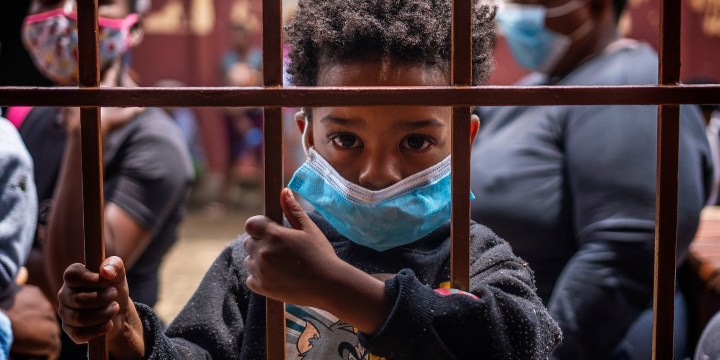OP-ED
Early Childhood Development is far too important to entrust to the struggling and inadequate Department of Basic Education

The Department of Basic Education has failed to fulfil its mandate. Requiring it to take over the critical Early Childhood Development sector will not only further cripple the department, but negatively affect the lives of millions of children.
On 21 March, South Africa commemorated Human Rights Day. In addition to remembering the horrors of the Sharpeville massacre of 1960, the intention on this day is to reinforce the commitments made in the Bill of Rights. This includes children’s rights as enshrined in Section 28 of the Constitution and Section 29 which guarantees everyone the right to basic education. While much has changed since the 1960s, painful inequalities in literacy and access to quality early education persist in South Africa.
Globally, over 43% of children under the age of five are at risk of not fulfilling their full developmental potential due to risks of poverty, poor nutrition and a lack of access to basic services and early enriching opportunities. In sub-Saharan Africa, 36% of adolescent girls are excluded from school. In Malawi, 95% of Grade 2 students are unable to read a single word, while in South Africa, 16% of Grade 3 pupils are unable to meet the lowest level of literacy, showing that harmful, lifelong literacy gaps begin at an early age.
Early Childhood Development (ECD) is therefore an integral part of development that requires dedicated resourcing, a progressive policy environment and robust governance. The Children’s Act (2005) defines ECD as “the process of children developing their emotional, cognitive, sensory, spiritual, moral, physical, social and communication capabilities from birth to school-going age”, making this sector critical for the early introduction and development of learning and social skills.
The National Development Plan (NDP) “recognises quality early childhood development… as a sustainable and cost-effective way of ensuring the optimal development of children [and]… as a key lever to overcoming the apartheid legacy of poverty and inequality”. The South African government has taken steps to prioritise the sector by introducing the ECD conditional grant in 2017, which is managed by the Department of Social Development (DSD). The primary objective was to address inequality while increasing the number of children accessing ECD services and subsidising centres that offer ECD services to children from low-income households.
The importance of a strong ECD sector has been widely reported, acknowledging the lifelong impacts good foundational education has on long-term education outcomes and earning potential in adulthood. The converse can be said as well — a lack of a good early childhood education can trap families in generational poverty cycles that may take longer to break out from. This sector has the potential (if fully and deliberately developed) to help bridge the widening inequality gap in South Africa in the long term.
The services ECD centres offer to go beyond a place to leave a child for the day — they provide meals that some families may not have access to; provide mental stimulation that some parents or guardians are not equipped to deliver; and place children in an important environment where they interact with contemporaries as well as adults, which fosters faster language and reasoning abilities and skills.
The system, therefore, cultivates a holistic approach to learning, not just cognitive stimulus, but social development. The Lancet series defines this as nurturing care — an environment that brings together health, nutrition, security, safety, responsive caregiving, and early learning. This must be provided in symbiosis by parents and family interactions as well as the ECD environment that enables these interactions.
There is now a proposed migration of ECD services to the Department of Basic Education (DBE) from the Department of Social Development but, as South Africans, we know that the public basic education sector has failed to fulfil its current mandate. Therefore, requiring it to take over this critical sector would not only further cripple the DBE but negatively impact the lives of millions of children. The DBE’s history with poor education and general programme outputs should be a major concern. Triple legal challenges have been levelled against the DBE by civil society groups for its inability to ensure equal access to basic education and inability to provide safe basic services, resulting in the deaths of learners. This does not sound like a sector equipped to handle smaller children.
Basic education and service delivery
South Africa’s basic education sector is marred by inadequate delivery on infrastructure, water and sanitation, which has grave consequences on the learner experience, as highlighted by the Public Service Accountability Monitor (PSAM). With over 3,000 schools across the country still using pit latrines and well over 7,000 relying on rainwater harvesting, this is not a sector equipped to take on early childhood development in the immediate to medium term.
Water, sanitation and hygiene (WASH) are so important in ECD that the sector being taken over by an already struggling department could be detrimental to children’s health, development and safety.
The DBE has failed to fully implement the Norms and Standards for school infrastructure, failing to meet both the 2016 and 2020 norms deadlines. Not only that but in the Eastern Cape 147 schools’ water has been cut off due to non-payment, indicating a department already overburdened.
The funding for infrastructure in the department is set to be reduced by R413.3-million over the medium term. The Budget Review (page 59) shamelessly states that “low compensation growth of 0.8 per cent over the MTEF period, combined with early retirements, will reduce the number of available teachers. This, coupled with a rising number of learners, implies larger class sizes, especially in no-fee schools, which is expected to negatively affect learning outcomes”.
This is a blatant admission that the sector cannot provide equitable education to the poorest learners in this country.
Learning outcomes in the basic education sector
Learning outcomes within the sector have not reciprocated the financial investment in basic education, which on average is above the Organisation for Economic Co-operation and Development (OECD) average of 3.1% of GDP. In 2016, South African learners ranked last in reading scores in a sample of Grade 4 learners from 50 countries participating in the Progress in International Reading Literacy Study (PIRLS). South African learners, therefore, exhibit substantial deficits in critical learning skills at early levels of education. These deficits in critical literacy skills not only persist throughout higher levels of education but ultimately spill over to all other subjects.
The ability to read and learn in an enabling and safe environment is critical for early cognitive development, therefore serious consideration needs to be made before the official merging of the ECD programme to the DBE, a government department that has failed to meet its own annual targets in service delivery and learner outcomes. The ECD programme needs practitioners and academics to help create a department that will not only protect learners and their education but strive to produce life-long outcomes that can compete at international levels.
Over several years, the department has failed to meet annual targets on infrastructure development and the provision of water, sanitation and electricity. These services are critical to the development of a thriving ECD sector with the required resources to create a conducive learning environment. Chronic underspending, fruitless and wasteful expenditure and maladministration have characterised governance of the basic education sector.
Therefore adding ECD to the DBE’s portfolio must be accompanied not only by adequate human and financial resources but clear monitoring and implementation plans. This is especially true within any inter-departmental programmes that have associated governance structures — clear systems of transparency and accountability are pivotal. Failing to meet the learning needs of South Africa’s children will continue to mete out the highest cost imaginable to the country’s development agenda. DM
Andile Cele is a research and advocacy consultant at the Public Service Accountability Monitor as well as coordinator of the Budget Justice Coalition, a network of South African civil society organisations working collaboratively to build people’s participation in and understanding of South Africa’s budget and planning processes.














Comments - Please login in order to comment.